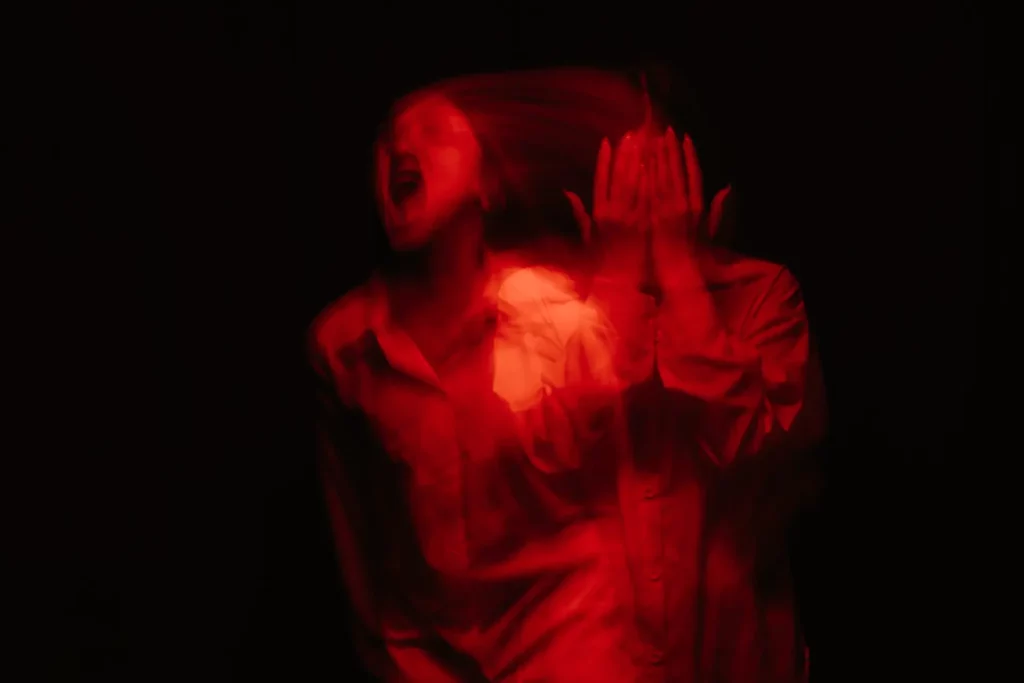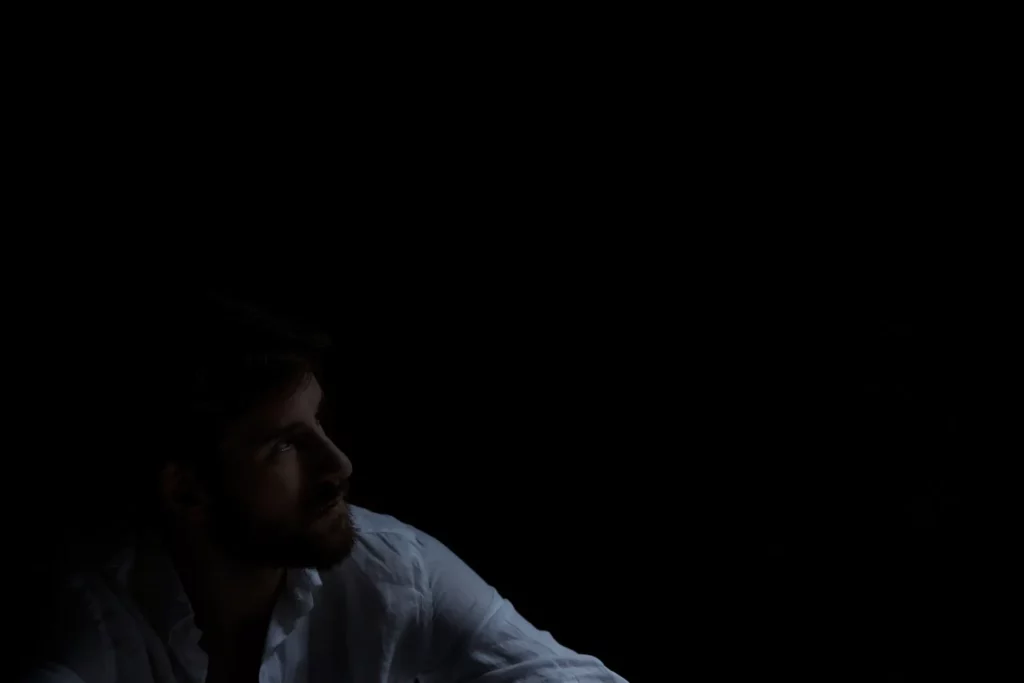Inhaltsverzeichnis
- The cycle of traumatisation through patriarchal structures
- My yacht – my house: Traumatic ego structures and their effects in daily life
- Autonomous self-management = inner leadership is the key
- The role of the rebel and the consequences
- The impact on men
- From Black Friday to Valentine’s Day: Patriarchal structures in the world of sales strategies in marketing
- Pathogenic structures of the patriarchal system
- The necessity for inner change
No, the jelly babies at the checkout are not ‘nicely meant’. First and foremost, they are used manipulatively. Entire branches and industries are involved in the ‘promotion’ of purchasing activities – fuelling a system that is designed for manipulation – and ultimately dependency. And this, in turn, is based on the concept of (capitalist) patriarchy.
But what does patriarchy mean, why do we blindly follow this system and why do so many people now want to disempower it? Patriarchy basically means ‘rule by fathers’. It is also described as a system of relationships, values, norms and patterns of behaviour that are shaped, controlled and represented by fathers and men. That – per se – is nothing reprehensible in itself. I take the meaning of patriarchy a little further – because this definition gives rise to the idea that ‘men are to blame’. But that is not correct, because men also suffer under this system.
It’s not about the ‘bad man’. It’s about a system that has been created. One that, in its current form, makes people ill.Men and women.
This is very important to understand. The patriarchal system – i.e. the belief that men are the stronger sex and therefore have the right to occupy important and powerful positions – only emerged later in human history.
The concept of women as the weaker sex is a cultural invention that only became established in the millennia after settling down.
Kai Michel, Historian and co-author of the book ‘The Truth about Eve’
Over the millennia, women have been pushed back more and more and no longer have access to education or the public sphere. Our entire life – the composition of medicines, for example, or the room temperatures in offices or even the safety distances in vehicles – everything is tested on men and designed for men. In other words, women as such do not exist. And not only that: it has been proven that the tests on men are not transferable to women. This means that the composition of the drugs is not suitable for women (gender health gap) or has a detrimental effect.
These structures became more and more entrenched and are still prevalent. All of this – ultimately built on an ‘idea’. The idea and the basic assumption – ultimately beliefs over generations that women are worth less.
Ruthlessness, demonstrations of power and oppression have increasingly paved the way – right up to the present day. Patriarchal structures have traumatised entire generations and continue to do so – traumas are passed on transgenerationally and continue to affect seven subsequent generations. They are deeply rooted in our society and influence our thoughts and actions in subtle and less subtle ways.

The cycle of traumatisation through patriarchal structures
The millennia-long cycle of traumatisation influences our thoughts and actions. Every day. How we deal with issues, what inner image we have of a ‘real man’, what image we have of a woman, of what a ‘good woman’ should be like or what behaviour is not acceptable – right down to our self-image of who is allowed to sit on the board of a company and who is not, and even what skills are ascribed to a woman or who ‘earns’ what money.
All these everyday things have been moulded so that they seem ‘normal’ to each of us.
But what if our learnt ‘normal’ is not normal at all, but the result of a sick system?
What if the artificial images and constructs created over thousands of years – our lived film – are not correct at all? A little girl who is taught that she has no value because she is a girl will very probably ‘conform’ to this inner image as an adult woman and behave accordingly or fight against it and – if she has had a different experience (i.e. being very valuable through a promotion, for example), then she will most probably not believe it inside herself.
Powerful programming! Everything, but not ‘normal’.
That’s what it’s all about: power. About control. What do power and control do? Fear. Division. Fear, in turn, creates a feeling of lack. And lack in turn leads to people becoming dependent. Addicted because they feel empty inside and ‘too little’. Lack is anaesthetised with substances and substitutes: Alcohol, drugs, buying, work…
But that’s not all: on the other side are those who – also as a result of traumatic conditioning – reinforce the feeling of lack and often become manipulative. The media suggest which cream you still ‘need’, which optimisation things you are still ‘missing’ (THE dress for this party, THE protein shake, THIS further training, MORE… you name it).
‘Missing’, “need”, “more”… are puns on the feeling of lack. Lack within – usually due to age-old traumas – creates the pull to fall for marketing manipulations and to really believe or justify to yourself why you need xyz NOW. Black Friday is such an example. Or Valentine’s Day or Christmas. With the latter two, an originally culturally anchored festival is misused in the sense of patriarchal scarcity. And most people ‘go along with it’. This is perfect subconscious programming.

My yacht – my house: Traumatic ego structures and their effects in daily life
Ignorance of the programming and conditioning at work in the subconscious leads to structures that want to keep other people down. Living from the ego wants power. At any price. We find these structures in large companies as well as in politics: these are places that promote these behaviours (out of habit and fear) and at the same time increasingly reinforce and maintain them. The networks in such companies are broad and opaque. Those who are subject to certain social norms, have the right name and have studied at a prestigious university – and belong to the inner circle – come to power. That is the unwritten code. Not visible or tangible to the outside world. But it is there.
To ‘play along’ there, one thing is very important: no longer feeling yourself. Having split yourself off at an early age – no longer feeling anything – then… you are ‘successful’, at least from an egocentric point of view. When traumatised, the ego is very powerful. Your own, actually lacking, self-esteem and emotional incompetence must not be felt. At all costs.
The ‘other people’, the victims of these ego structures, naturally don’t dare to speak up, to do anything, or even to protest. They have learnt to be quiet and not to attract attention.
It should also be mentioned that these structures also work in places where you would not expect them: the so-called ‘spiritual circles’ have developed almost as a counter-movement with the same content: One is ‘the guru’, the one who says how it is ‘right’. And that… is highly dangerous. In case of doubt, people who seek inner reflection and an exit from the original pathogenic system fall back into the same pattern, only this time with spiritual overtones.
Autonomous self-management = inner leadership is the key
The top priority for me, whether in my yoga school in the past, in psychotherapy, as a therapist and person in general or in coaching, is to help people to help themselves. This means accompanying people, showing them the interdependencies, developing tools together with them to find their own solutions – and then letting them continue on their own path.
However, what is usually practised is the (renewed) dependence on people. Be it through bonus models, through discounts, through inadequate therapies that do not address the underlying structure but remain at symptom level, through immobilisation with medication, etc. This keeps people in a never-ending loop of ‘need’ for years. This is what we have been taught, this is how the world works in our misguided perception.
Victims ‘need’.
But what is essential is the ability to lead oneself. However, very few people have been given this ‘just like that’. We simply don’t know ‘how it works’ to lead ourselves if we are always ‘in need’. In a patriarchal system, rigid roles and norms are often imposed that restrict individual growth and self-determination. People develop insecurity about what they are ‘allowed’ to do and often do not even know their own needs, abilities or values. Orienting themselves to predetermined roles and expectations instead of going their own way is ingrained.
The role of the rebel and the consequences
The rebel – or the ‘black sheep’ – is someone who no longer allows themselves to be forced into these roles, but thinks for themselves and decides for themselves. He or she is – socially speaking: uncomfortable. And of course this is penalised by the ‘patriarchal system’. Not openly, but more covertly. Be it that people ostracise him or her, simply no longer speak to him or her. He doesn’t get the job or the pay rise. Bullying, bossing, gaslighting, benching, ghosting – all methods that are basically one thing: violent. And therefore a punishment. Which usually leads to profound stress.
But why are such behaviours tolerated at all? Well, they are often very subtle. And they are also ‘normal’ – and a great fear on the part of society as a whole prevents them from being exposed: ‘It’s like that everywhere!’ And that brings us back to the ‘patriarchal system’.

The impact on men
As already explained, patriarchy does not only harm women. This was the original start. But men also fall victim to this system. Sensitive, sensitive men. They suffer. And those who bow to the pressure and play ‘Rambo’ often suffer in silence. They are trapped in a system in which they themselves have grown up with the label ‘normal’.
For many, illnesses, especially mental illnesses, are not compatible with the classic ideal of masculinity.
Anne-Maria Möller-Leimkühler from the Executive Board of the Men’s Health Foundation (https://www.rnd.de/gesundheit/depression-bei-maennern-warum-viele-ihre-psychischen-probleme-nicht-ansprechen)
The classic, traditional ideal of masculinity, which has lain dormant in our genes (including those of women) for thousands of years, is orientated, spoken or unspoken, towards:
- Strength and toughness: Traditional ideals of masculinity often emphasise physical strength and emotional toughness. Men are expected to be strong, robust and resilient.
- Dominance and control: In a patriarchal system, men are often expected to take a dominant role in their relationships and in society as a whole.
- Competitiveness and success: Men are often encouraged to be competitive and successful in all areas of life, including careers and sports.
- Emotional restraint: Men are often encouraged to hold back their emotions and not cry or show weakness (‘A boy doesn’t cry!’)
- Autonomy and independence: Men are expected to be self-reliant and independent and are often expected to be able to provide for themselves and support their families.
- Willingness to take risks: Masculinity is often associated with a willingness to take risks and a thirst for adventure.
- Sexuality: In many patriarchal societies, men are expected to be sexually active and aggressive.
- Rationality and logic: Men are often portrayed as more rational and logical than women.
- Leadership: Men are often encouraged to take on leadership roles in society and in the family.
- Responsibility and sense of duty: Men are expected to take responsibility for their actions and have a strong sense of duty.
All of these norms, passed down through generations and generations… inherited norms are still carried by men today. Just one deviation from them – and you’re out, at least as a ‘real’ man. A weakling, a wimp. At least that’s how men who come to me for holistic coaching feel. They feel ‘wrong’ in a system that doesn’t suit them. In which they have somehow held out for so long. Have they lived? They haven’t. Always the unconscious pressure, at work, but also from their partner.
Today we know that male dominance is neither willed by a god nor rooted in nature. It is a cultural aberration – and we can change culture.
Kai Michel, Historian and co-author of the book ‘The Truth about Eve’
From Black Friday to Valentine’s Day: Patriarchal structures in the world of sales strategies in marketing
Advent – a time of joy and togetherness. Actually.
In the shadow of the glittering shop windows and tempting online offers from Black Friday to Valentine’s Day… hides a deeper and mostly unconscious structure that influences our purchasing decisions. Patriarchal structures, deeply rooted in our society, also play a decisive role here.
The patriarchal structure, which is based on hierarchy and dominance, is also reflected in the way companies advertise and sell their products. Competition, the urge to be the ‘first’ ‘strongest’ or ‘best’, the use of power and influence to guide purchasing decisions – these are all elements that can be found in patriarchal systems as well as in aggressive marketing strategies.
A classic example is Black Friday, a day known for its extreme discounts and the chaos it often causes in shops and online shops. The message conveyed on this day is clear: be the fastest, be the strongest, fight your way through the crowd (or through the website) to get the best deal. The message is: competition, dominance and ‘winner mentality’ – all characteristics traditionally associated with ‘successful’.
But it goes further than that. The way products are advertised can often reinforce gender stereotypes. From adverts that often portray women as overly concerned with shopping and discounts, to the assumption that tech products are mainly for men, many companies’ marketing strategies rely on and reinforce patriarchal notions.
The world of marketing channels such as Instagram, Facebook and the like is now just as flooded: manipulative marketing strategies, cold calls or unsolicited direct messages – with multiple aggressive requests if the ‘target’ does not respond – are now the order of the day.
The same applies to the coaching profession. Theoretically, anyone can call themselves a coach, even if they have not undergone in-depth coaching training. Very often, there are ‘coaches’ in this very responsible profession who are not coaches and who promise people, for example, ‘6-figure sales in 3 weeks’ – with appropriate images as a backdrop, of course – or urge them to book immediately because the price will be twice as high ‘tomorrow’. All of this: patriarchally coloured manipulation. Jumping on the coach bandwagon without a basis is also part of this.
It is important to recognise these manipulation mechanisms. To question them by realising how these deep-seated structures influence our purchasing decisions and our understanding of value and success. Because ultimately, the true value of a product is not the discount we receive (and pay again elsewhere!), but the meaning and benefit it has in our lives.
Pathogenic structures of the patriarchal system
It is seething underground. Silent rage and suppressed pain lead to illnesses and full doctors’ surgeries, as well as psychotherapies that last for years. The effects of patriarchal norms are felt not only psychologically but also physically. Many illnesses, from mental disorders to chronic diseases, can be traced back to the stress factors and traumas caused by patriarchal structures.
The necessity for inner change
The solution does not lie in simply adopting a different system. The solution lies first of all in recognising – and then consciously acknowledging – that this system has made our society sick. Sick in our views, in our daily lives, in our thinking.
In the mindful and loving search for a common, open and creative solution – that is where the solution lies. It is about living life and working on our own issues. Because these are the seeds of envy, hatred, oppression and war.
For real change, our thinking must change. It must transform into feeling and perception. Into connection. Into being human. Into authentic communication. Into becoming healing. It is a process that starts from within and spreads outwards. Just like that.
It’s not about putting more women at the top of the organisation when the organisation itself is still subject to old power structures. It’s not about equality in child rearing if the underlying system is not ready for it. It is not about gender-independent salary payments.
These are all symptoms, the effects of patriarchy.
But not the solution. That would be like plugging a leak in a boat when the boat itself is sinking.
It’s about the foundation.
And the basis is you. Me. Every single person. Can work on their own issues. It’s called ‘sweeping your own front door’. And that’s what it’s all about.
From the inside out. If this is the case, equal rights, equal pay and women at the top of the organisation will happen all by themselves.
These are the first keys to sweeping your own front door:
- Being aware: Knowledge is power, and in this case it is the power to recognise and question patriarchal structures. Through workshops and seminars, we can all become aware of how deeply patriarchy is rooted in our thoughts and actions. Only when we recognise it can we begin to overcome it.
- Empathy and respect: One of the most effective ways to overcome patriarchy is to create a culture of empathy and respect. This means learning to understand and respect other people’s perspectives and experiences, regardless of their gender or beliefs. It is about creating an environment in which each person is recognised and valued as an individual.
- Personal development and self-reflection: Change starts with ourselves. By questioning our own prejudices and stereotypes and endeavouring to be more mindful and respectful in our dealings with other people, we can make a contribution to overcoming patriarchy. This is a process that takes time and patience, but the results are worth it. Every step we take towards self-awareness and self-improvement is a step away from patriarchy and towards a more just and loving world.
I accompany people who have become ill in and through the system or who are currently going through an inner upheaval. If this is you and you would like to be accompanied on this path, please book an initial personal (online) consultation with me.
I look forward to meeting you.
Best regards, Christine


